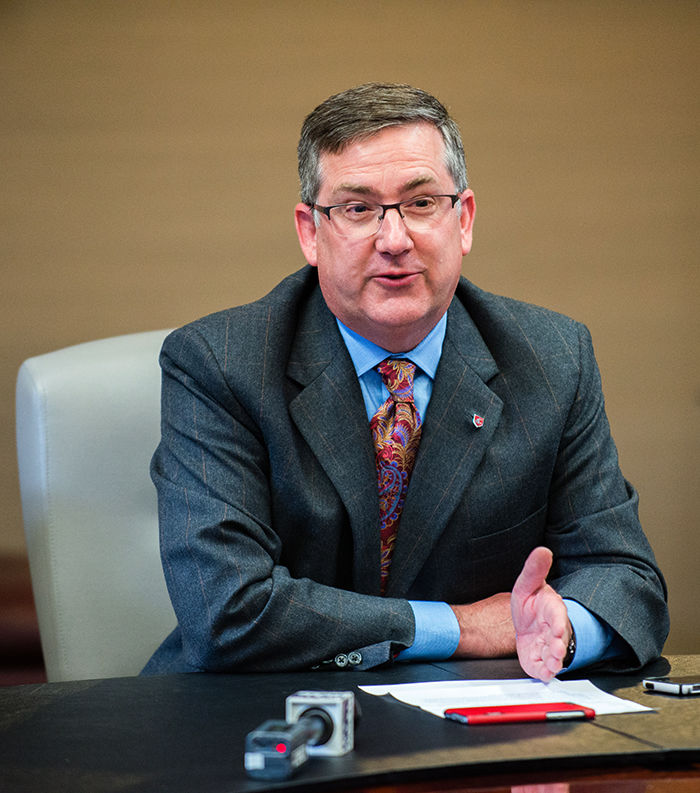‘Drive to 25’ needs a better map
February 16, 2017
President Kirk Schulz officially announced the “Drive to 25” initiative in his annual State of the University address. As it stands, he has laid out a road trip without a GPS, let alone a map.
The goal to propel WSU into the top 25 research universities in the country is admirable. It even might be achievable by Schulz’s intended benchmark of 2030.
Currently, WSU is ranked 73 by the Center for Measuring University Performance (MUP), a collaborative index between Arizona State University and the University of Massachusetts-Amherst. This index is composed of data from nine sources: federal research monies, total research dollars, endowment assets, total giving, national academy members, faculty awards, postdoctoral appointees, doctoral degrees awarded and median SAT sources.
If these look familiar, it is because similar metrics were noted by Schulz in a Jan. 20 all-campus email titled “Onward in the Drive to 25.” Eleven metrics were broken down into three subcategories: American Association of Universities (AAU) membership metrics, peer-comparison metrics and strategic WSU-specific metrics.
“We will determine our overall ranking by taking the average of our standing among public research universities in our peer comparison metrics and selected AAU metrics as reported annually by the Center for Measuring University Performance,” Schulz said in the email.
This statement alone feels like a few backroads are being taken in the Drive to 25. The president explicitly states ranking will be determined only among public research universities, meaning we will not be contending with the rankings of Harvard, Stanford, Johns Hopkins or Yale, which respectively dominate the top four positions of the MUP.
In the town hall transcripts concerning the “Drive to 25,” published Sept. 16, Schulz admitted the metrics were not ironclad. “Are these metrics set? No,” he said.
As an economist and statistician, I have appreciation for the power of numbers as indicators of actual causal relationships. However, my Jesuit undergraduate education always has me questioning whom the numbers serve.
The 2014 to 2019 university strategic plan cites two pillars for the institution’s development: a transformational student experience and a preeminent research portfolio. Though easy to measure, increased research dollars, faculty awards and undergraduate involvement in research do not inherently make for transformative education or research projects worthy of national esteem.
The problem with rigorously measuring an initiative like the “Drive to 25” is similar to the problems of the Fitbit: tracking every step does not make the exercise conducive to growth or fulfillment.
Similarly, pushing WSU toward the prestige it seeks to attain will be as much a project of heart and culture as nice looking numbers.
“We can’t neglect our teaching mission,”English department chairman Todd Butler said, “and currently, the external metrics being used to evaluate progress say little to nothing about ensuring the quality of instruction.” That’s not necessarily WSU’s fault, but it does mean we have to put some effort of our own into this area.”
One could compare any metrical measure of a university’s merits to a country focusing on Gross Domestic Product (GDP) as an index of national prosperity. On one hand, it gives a good indication of gross national productivity. On the other hand, GDP says nothing of income inequality or standard of living.
As praiseworthy as achieving institutional greatness in research is, at some point WSU will need to feel like it is on the road to being a top 25 public research institution. This transformation must be — to rehash an election cycle mantra — a matter of head and heart.
In short, the roadmap on the “Drive to 25” must be as culturally focused as it is numerically.
Tyler Laferriere is a graduate student pursuing his master’s in economics from Phoenix, Arizona. He can be contacted at 335-2290 or by [email protected]. The opinions expressed in this column are not necessarily those of the staff of The Daily Evergreen or those of The Office of Student Media.

















